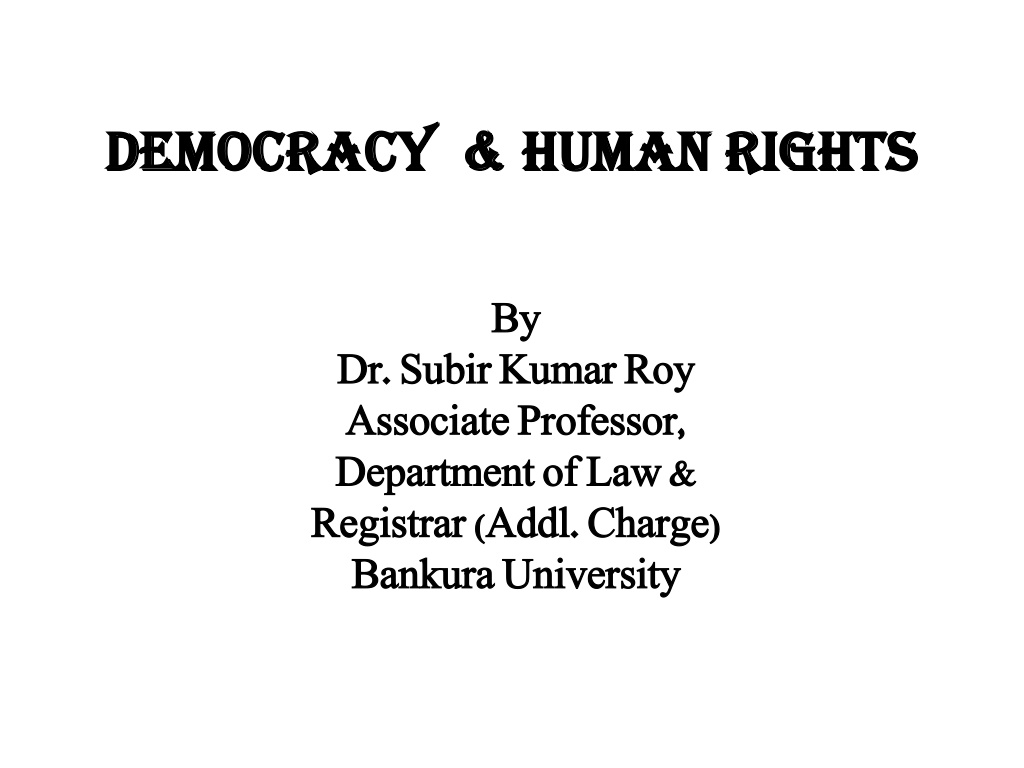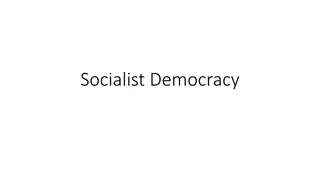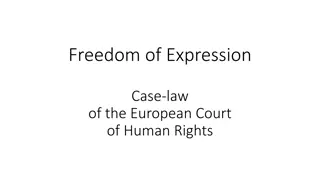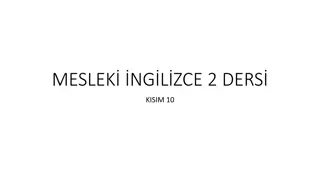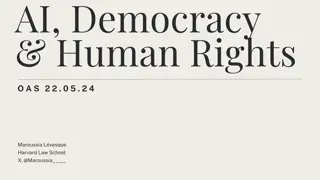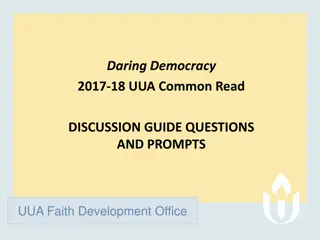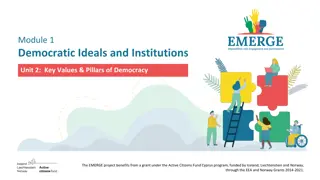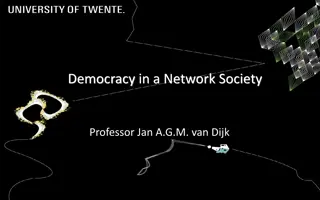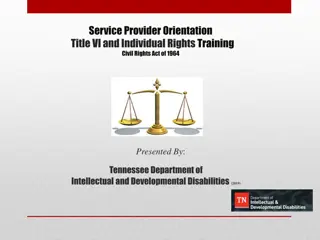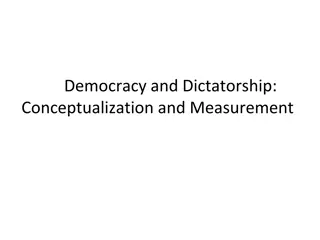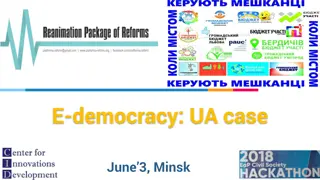The Link Between Democracy and Human Rights
The core of democracy lies in promoting equal human worth and self-determination. There is a strong connection between human rights, democracy, good governance, and development. Democracy allows people to participate in decision-making, ensuring their views are heard. It upholds freedom, equality, fraternity, tolerance, and justice - essential values for human rights. A democratic environment enables individuals to express their opinions freely, shaping public opinion and realizing human rights. The will of the people expressed through elections forms the basis of government authority, as stated in the Universal Declaration of Human Rights.
Download Presentation

Please find below an Image/Link to download the presentation.
The content on the website is provided AS IS for your information and personal use only. It may not be sold, licensed, or shared on other websites without obtaining consent from the author. Download presentation by click this link. If you encounter any issues during the download, it is possible that the publisher has removed the file from their server.
E N D
Presentation Transcript
Democracy & Human Rights Democracy & Human Rights By By Dr. Subir Kumar Roy Dr. Subir Kumar Roy Associate Professor, Associate Professor, Department of Law & Department of Law & Registrar (Addl. Charge) Registrar (Addl. Charge) Bankura University Bankura University
Democracy & Human Rights The core object of democracy rests upon the idea of equal human worth or dignity and human self determination or autonomy. The world polity is almost agree on this point that there exists a linkage in between human rights, democracy, good governance and development.
Actually the spirit of human right materializes only in a democratic framework grounded in the rule of law. The cardinal philosophy of democracy is that, all power rests with the people and the above proposition enable them to take direct participation in decision making process. In other words it can be said that people gets an opportunity of expressing their views about the working of government and also to generate public opinion among the society. Often democracy is criticized as the tyranny of majority but one should not forget that it contains the inbuilt mechanism to accommodate the views of minority otherwise it will fail to uphold the dignity of the people, which is the basic signature tune of democracy.
a democratic environment enable the individual to air his or her view and if the legal authority will show the reluctance to pay heed to that opinion on the ground of lack of endorsement from the majority of the society may be proved costly for the government in near future because if that opinion has any substance then that may gradually create a strong public opinion in the society. Freedom, equality, fraternity, tolerance and guarantee of justice is the core value of democracy which also strengthens the concept of human rights as well.
Democratic setup enables the people to realize the human rights in real sense. Art. 21(3) of Universal Declaration of Human Rights authenticate the above statements which states that the will of the people shall be the basis of the authority of government and the above will is expressed in periodic and general elections, happened through universal and equal suffrage, by secret vote or by equivalent free voting procedures.
The modern world polity is gradually developing the universally accepted legal standards on the basis of which the kind of governance of each state is assessed. In a democratic set up a government of a state is supposed to work for ensuring the welfare of the people, their development by incorporating the idea of the principle of equity and justice and to install a mechanism so that citizen can be involved in decision making process. The above activities are not charity on the part of a government rather in democracy always a strong public vigil watches minutely the activities of the government and if their work is not pro bono publico then it has to face the wrath of people and may be kicked out from the power.
The founding fathers of the constitution intended to architect the constitution in such a manner which may fulfill the aspirations of the people and undo the misdeeds of the British rulers. The founding fathers and mothers of the constitution were highly motivated by the three great revolutions of their time i.e. the French, American and Russian revolution and we find the influence of the noble ideas of these revolutions in the way of the notion of justice, liberty, equality, good and sensitive governance etc.
Basically the Indian Constitution is a social document and more combination of social statements. The Indian Constitution as an intellectual artifact contains within its gamut all the imperial and kingly ideals of some constitution of the world among which it is worthwhile to mention constitution of USA, Canada, French, Irish and legal mechanism of Britain. particularly revolutionary a about the
Indian constitution emanates from the people, its power are granted by the people and will be applied and exercised for their benefits. The various organs of the government get power from the constitution and beside the constitutional control they are also subjected to the control of the people but at the same time the people are supposed to use this control in legitimate mode.
Dr. B. R. Ambedkar observed, Our Constitution as a piece of mechanism lays down what is called Parliamentary Democracy. By Parliamentary Democracy We mean one man one vote. Like the Britain cabinet system, Parliament in our system is not the sovereign and being a Republic the provision of a titular head of the executive has been incorporated, known as President of India and the election of which is made in an indirect method through an electoral college. Nehru himself clarified the stand in Assembly We want to emphasize the ministerial character of the government that power really resided in the ministry and in the legislature and not in the President as such. (Constituent Assembly Debates, Vol-IV, p- 732) In this way the makers ruled out to give any way to the system of monarchism. The Prime Minister is the key stone of the cabinet arch and such cabinet remains accountable to the House of the People.
In Ram Jawaya v/s State of Punjab MUKHERJEA, C.J. observed, Our Constitution . Is modeled on the British Parliamentary system where the executive is deemed to have the primary responsibility for the formulation of governmental policy and its transmission into law though the condition precedent to the exercise of this responsibility is its retaining the confidence of the legislative branch of the Constitution, therefore, we have the same system of Parliamentary executive as in England and the Council of Ministers consisting, as it does, of the members of the legislature is like the British Cabinet, a hyphen which joins, a buckle which fastens , the legislative part of the state to the executive part. AIR 1955 SC 549 state In the Indian
Art.74 (1) of the Indian Constitution is modified through the Constitution Amendment) Act, 1976 which make it mandatory upon the President to act as per the advice tendered by the Ministers. It is true that though President is symbolic head and bound to follow the will of the Ministers but still ample of scopes are there in the Constitution where President may perform very crucial role such as to decide to whom he will invite to become Prime Minister especially where there remains the situation of hung Parliament. (Forty- Second
India is a largest democracy in the world and right to vote gets a constitutional status here. As per Art.326 the elections to the House of the People and to the Legislative Assembly of every state shall on the basis of adult suffrage; that is to say, every person who is a citizen of India and who is not less than 18 years of age and not otherwise disqualified by the law of the land is entitled to vote. Art.325 of the Constitution gives a mandate that there shall be one general electoral roll for all. Art.327 and Art.328 respectively confers power upon the Parliament and the Legislature to make provisions with respect to elections to such Legislatures. Sir Alladi Krishnaswami observed, I should think the boldest step taken by our assembly is in the matter of universal adult suffrage with a belief in the common man and in his power to shape the future of the country. Constituent Assembly Debate, Vol-7, Nov-1948, P-336
In Jyoti Basu v/s Debi Ghosal AIR 1982 SC 983 it has been observed by the Supreme Court that a right to elect and right to be elected is neither a fundamental right nor a common law right. It is pure and simple a statutory right. The indication of the Supreme Court was towards the Representation of the People Act, 1951 which gives the guarantee of the above. However it is humbly submitted that the right to vote through Art.325 and 326 also attains the constitutional status and strengthens the position of the above right especially when the Judiciary termed the democracy as the basic feature of the constitution. Art.324 of the constitution establishes the office of the Election Commission, the duty of which is to ensure free, fair and impartial elections to Parliament, State Legislatures, offices of the President and Vice-President.
To condition precedent to the successful working of democracy : There should not be glaring inequalities in the society, The existence of an opposition, No tyranny of majority, Observation of constitutional morality, Equality in law and administration, Moral order of society, etc. Ambedkar following are the
